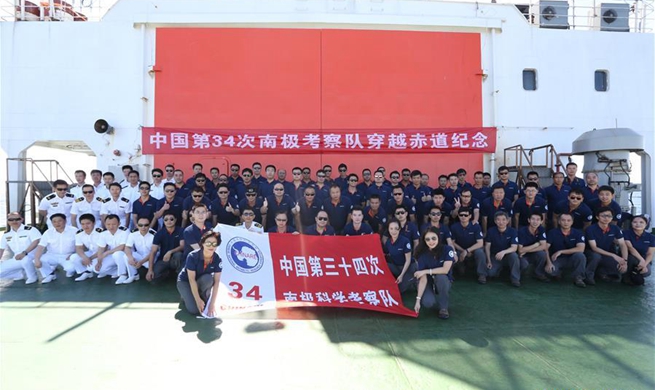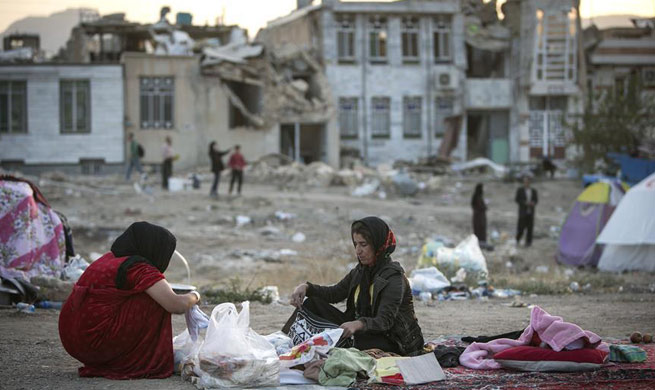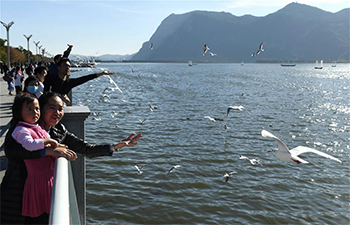TOKYO, Nov. 16 (Xinhua) -- A former U.S. Marine and civilian base worker at the opening of the trial at the Naha District Court on Thursday, while denying his intention to murder, stands accused of raping and killing a 20-year-old woman in Okinawa, as anti-U.S. base sentiment continues to rise in Japan's southernmost prefecture.
The defendant, Kenneth Franklin Shinzato, 33, who was working at a company within the premises of the U.S. Kadena Air Base in Okinawa at the time of the incident having served as a U.S. Marine from 2007 to 2014, denied the charges of rape resulting in death and abandoning the victim's body, however.
Shinzato stands accused of assaulting the woman for the purpose of raping her.
The attack is believed to have taken place on a road in Uruma in central Okinawa at around 10:00 p.m. on April 28, 2016.
According to the indictment, Shinzato struck the women on the head with a metal bar and fatally stabbed her in the neck with a knife to stop her struggling.
Shinzato said he had intended to let the woman go after raping her, and denied that he had intended to murder her, with his defense counsel stating that he did not stab her during the initial assault, local media reported.
But prosecutors maintained that Shinzato had intended to murder her and referenced the victim's neck being stabbed multiple times and the fact that Shinzato had prepared a suitcase to transport the body.
The accused also changed his clothes at a hotel following the murder, prosecutors said, according to local media accounts.
Shinzato, as was the case after he was arrested when he refused to speak to investigators, refused to speak to his own defense counsel or prosecutors during the hearing in the afternoon, local media reports said.
Shinzato, whose Japanese language ability is limited, had an interpreter available to use.
In August last year, Shinzato's request for the trial to be held outside Okinawa, fearing a local lay judge trail could be biased by the rising anti-U.S. base sentiment on the island, was rejected by the Supreme Court.
The court will hand down its ruling on the case on Dec. 1.
As evidenced by the continued outpouring of grief at a number of memorial services and ceremonies held since the young girl's death, local observers have said that it is abundantly clear that anti-U.S. base sentiment is steadily on the rise in Japan's southernmost prefecture that hosts the vast majority of the U.S.'s military bases in Japan.
Okinawans are adamant that the central government and the U.S. returning land used by the bases and relocating the troops off the island is the only way for them to hope to ever lead normal lives.
The skeletal remains of Shinzato's alleged victim, who was taking a walk at the time she was attacked, were found on May 19 of last year in a wooded area in the village of Onna, north of Uruma, according to Shinzato's statement.
The alleged brutal slaughtering of Shinzato's young female victim was preceded by numerous drink driving incidents in Okinawa, another account of rape by a service-person in a hotel in Naha, and an unprovoked, vicious assault by a high-ranking military official on a young Japanese female student aboard a commercial flight to Japan.
In June last year, a massive rally, in the wake of the girl's murder, which garnered worldwide attention, took place in a park in Naha and saw around 65,000 protestors united in calling for the U.S. military on the island to withdraw completely and for an archaic agreement inked between the U.S. and Japan governing the handling of incidents caused by U.S. military personnel in Japan to be urgently reviewed.
The rally was the biggest organized protest in Okinawa since 85,000 islanders took to the streets in the days after three U.S. servicemen viciously raped an elementary schoolgirl in 1995, an abominable crime that still haunts the consciousness of Okinawans of all generations.
Okinawa Governor Takeshi Onaga, a staunch advocate of lessening the base-hosting burdens of the islanders, and in particularly blocking the central government's plans to relocate the U.S. Marine Air Station Futenma within the prefecture, at the time, reiterated his calls for a key agreement between Japan and the U.S. to be urgently reviewed and for the bases to be kicked off the island for good.
The Japan-U.S. Status of Forces Agreement (SOFA) was originally inked in Washington between the U.S. and Japan in 1960, and many politicians such as Onaga along with political watchers believed it did not work to effectively legislate the treatment of U.S. service-people in Japan who commit crimes and does not reflect the growing instances and severity of such.
Under the agreement at the time, U.S forces' personnel could be granted a great deal of legal autonomy and while the Japanese court system has jurisdiction for most crimes committed by U.S. service members, if the accused was "acting in official duty," or if the victim was another U.S. citizen, the U.S. justice system is used, not Japan's, despite the location.
In some instances, under SOFA, the majority of U.S. military members were exempt from Japan's visa and passport laws and past offenders have dodged the Japanese legal system by being transferred back to the U.S. before being charged.
Another loophole that existed in the agreement was that unless an offender is arrested outside of a U.S. base by Japanese police or investigators, then U.S. authorities were allowed to retain custody of that individual.
But it wasn't until in January this year that Tokyo and Washington signed a pact to effectively remove legal protection over some U.S. military base workers, aimed at deterring U.S. base-linked crimes in Okinawa, although many local officials have said the pact fell a long way short of their expectations.
Okinawa citizens took matters into their own hands in adopting a resolution condemning the murder of the young girl and demanding that definitive measures be put in place and enforced to prevent further heinous crimes from occurring in the future.
"The anger and sadness of the people of Okinawa has reached its limit toward the repeated incidents and accidents involving U.S. military and nonmilitary personnel," the resolution said.
It also demanded an apology from both the Japanese and U.S. government to the people of Okinawa and in particular to the family of the murdered woman. The resolution also called for compensation to be made to the family of the victim.
"To protect the lives and human rights of the people in Okinawa, it is urgent that U.S. bases be significantly reduced and consolidated, and for Marines to withdraw from Okinawa," the resolution said, adding that plans to relocate the Marine Corps Air Station Futenma should also be scrapped.
The resolution also stated that previous measures to curtail acts of crime or enforce discipline had failed miserably and that the only way to effectively prevent crime against locals from U.S. service-people going forward is to remove the U.S. bases from Okinawa island entirely.
All prefectural and local assemblies in Okinawa have adopted resolutions against the latest murder and the prefectural assembly is dominated by politicians opposed to the Futenma base relocation.
Such factors, observers said, along with growing indignation from locals, has added gravitas and political momentum to Onaga's moves to block the relocation, ahead of future moves to work towards seeing U.S. bases removed from Okinawa entirely.
According to Kyodo News, citing data from the local police and the Okinawa prefectural government, a total of 576 heinous crimes, including murders, robberies and rapes, have been committed by U.S. military-related personnel between May 1972, when the prefecture reverted to Japanese control following postwar U.S. occupation, and last December.
















